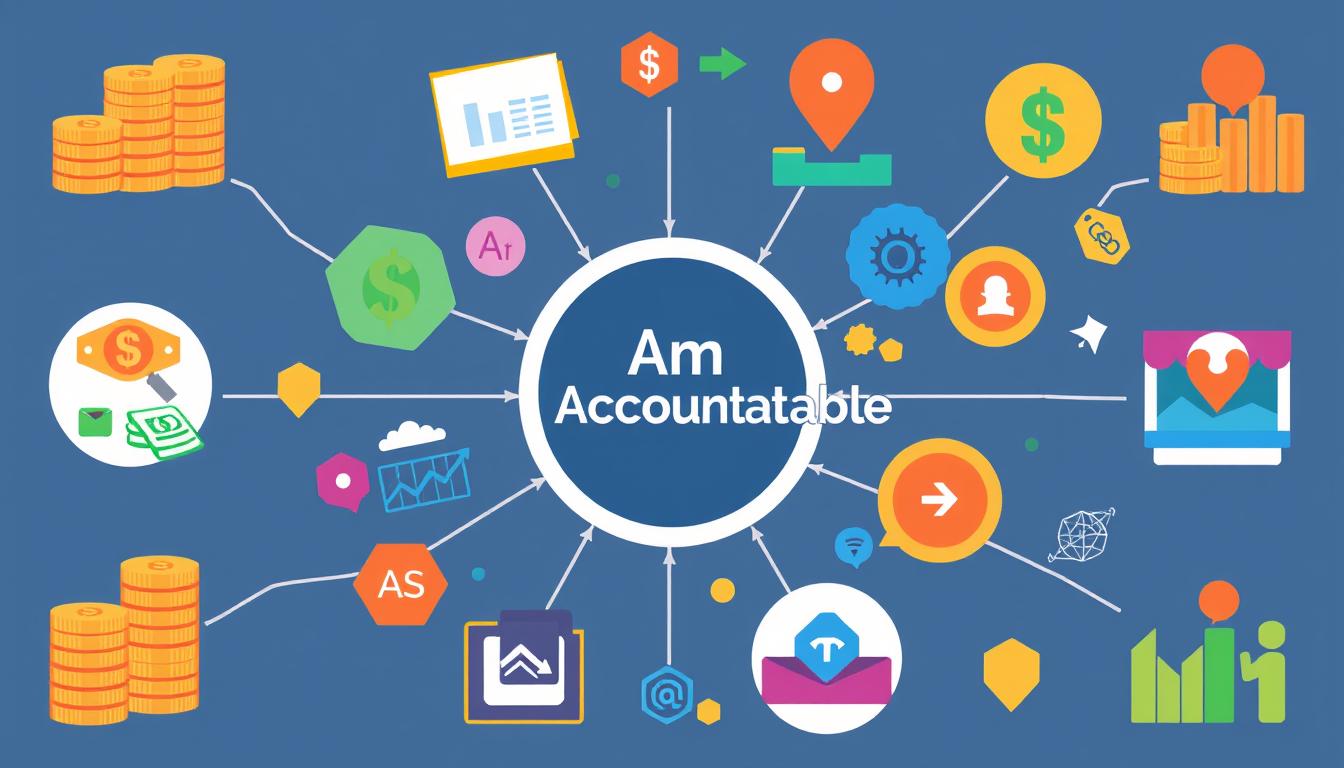Hyderabad , India
Starting a business is more than just a great idea. It needs the right money to make it real. At Am Accountable, we offer virtual accounting services for startups in India. We know how important funding is for growth.
Startups with the right money do better. They can cover costs, market their products, and grow. This is key for success.
Are you wondering, What funding options are there for startups in India, and how do I choose the best one for my business? Knowing about seed, early-stage, and growth-stage financing helps. It guides you through the funding world and matches your business goals.
Key Takeaways
- Startups in India have many funding options, like bootstrapping, crowdfunding, loans, angel investors, and venture capital.
- Finding the right money is vital for growth and keeping the business alive. It helps with operations, marketing, and expansion.
- Knowing the financing stages helps find the best funding for your startup.
- Using different funding sources can help your business grow and reduce risks.
- At Am Accountable, we provide virtual accounting services. We help startups in India build their financial base and find the right funding.
Understanding the Importance of Funding for Startups
Securing funds is key for any new business. It’s what helps launch and grow a startup. There are many funding sources, each with its own benefits and hurdles. At our virtual accounting service for startups in India, we know how crucial funding is for success.
Why Funding is Critical for Startup Growth
Global venture funding hit $437 billion in 2021 Q3, a big jump. Venture capital funding rose 14% in 2020, even with COVID-19’s challenges. This shows how vital the right funding is for a startup’s growth.
Stages of Startup Funding: Seed, Early-Stage, and Growth
The funding journey for startups has several stages. Each stage has its own needs and characteristics. Here are the main ones:
- Seed Funding: The first money to start a business, often from personal savings or small investors.
- Early-Stage Financing: Helps a startup grow, with funding from angel investors or venture capital.
- Growth Stage Financing: Focuses on scaling the business, using venture capital and partnerships.
Good funding helps a business grow globally, improve standards, and gain credibility. It’s key for customers, lenders, and employees.
We offer virtual accounting services for startups in India. Our service lets you build a virtual team fast, saving time and money. Call us at 91 91778 42756 to see how we can help with your startup’s funding.
Bootstrapping: Self-Funding Your Startup
Getting funding is key for startups to grow. But, bootstrapping is a great way to fund your business by yourself. This way, you keep full control and avoid the downsides of loans or giving up equity.
Benefits and Challenges of Bootstrapping
Bootstrapping lets you grow your business on your own terms. You’re not tied to investors’ demands. This means you can stick to your vision, not someone else’s. Plus, it helps you keep going even when the economy is tough.
But, bootstrapping has its own hurdles. You need to cut costs and make more money to grow. This might slow your startup’s start. And, you bear all the financial risks since you’re funding it yourself.
Tips for Effective Bootstrapping
- Take on multiple roles within the business to reduce overhead costs.
- Leverage free or low-cost resources, such as open-source software and online collaboration tools.
- Reinvest profits back into the business to fuel growth, rather than withdrawing funds.
- Pursue a profitable business model that generates recurring revenue streams.
- Explore alternative funding options, such as business credit cards or grants, to supplement self-funding.
Choosing bootstrapping can lead to a strong, profitable startup. You keep control and avoid risks from outside investors. With smart strategies and a focus on minimizing expenses and maximizing revenue, you can make your startup dream a reality.
Friends and Family Funding
At Am Accountable, we offer virtual accounting services for startups in India. You can quickly build your virtual accounting team in just 24 hours. Our services save you time, cut costs, and boost efficiency.
Many startups start with Friends and Family Funding for initial capital. This means getting money from your personal network. It’s fast and easy. But, it can also hurt personal relationships if not done right.
It’s key to clearly state the investment terms and manage expectations. Keeping things open and talking regularly with your investors is vital. This way, you treat their money with the same respect as outside investors.
“Friends and family investors are a form of crowdfunding where small amounts of money come from several family members or close friends to raise a more significant overall sum.”
A 2014 survey by the Kauffman Foundation found 40% of startup funding comes from friends, family, and acquaintances. Friends and family invest tens of billions yearly in new businesses. The average investment is $23,000.
While Friends and Family Funding is valuable for Initial Capital, remember that many startups fail. One in five fail in their first year, and half by their fifth, says the Bureau of Labor Statistics. So, have a solid plan and a good Relationship Management strategy.
Crowdfunding: Tapping into the Power of the Crowd
Crowdfunding has changed the game for startups looking for funding. It lets entrepreneurs tap into a big network of people who can help fund their ideas. This way, startups can reach out to many potential backers and investors all at once.
How Crowdfunding Works
Crowdfunding is when many people come together to support a project or business. There are different types, like rewards-based crowdfunding and equity-based crowdfunding. In rewards-based, backers get something in return for their money. In equity-based, they get a piece of the company.
The main idea is simple. Startups can ask for small amounts of money from lots of people. This way, they can raise the money they need to grow.
Launching a Successful Crowdfunding Campaign
- Craft a Compelling Pitch: Make a clear, short, and eye-catching campaign. It should show what your startup is about and how much money you need.
- Set Realistic Goals: Choose funding targets that match your startup’s plans and needs.
- Engage with Your Community: Talk to potential backers, answer their questions, and update them on your campaign.
- Leverage Social Media: Use social media to get more people to see your campaign and join in.
- Offer Attractive Rewards: For rewards-based campaigns, create perks that will attract your audience and encourage them to contribute.
By using crowdfunding, startups can get the money they need and build a community of supporters. This community can offer feedback, help test products, and even help with marketing.
“Crowdfunding has revolutionized the way startups can access capital, empowering entrepreneurs to turn their ideas into reality.”
The world of crowdfunding is always changing. It’s a great way for startups to get funding and reach more people. With a well-planned campaign, startups can tap into the crowd’s power and grow faster.
Funding Sources: Startup Business Loans and Grants
Starting a business needs the right funding to grow and succeed. You can look into startup business loans and grants. Each has its own benefits and things to think about.
Qualifying for Small Business Loans
Getting a small business loan means showing a good business plan and financial health. Your credit score, what you offer as collateral, and how much money you’ll make are key. The Business Development Bank of Canada (BDC) offers loans to help new businesses start.
Exploring Grant Opportunities for Startups
Startups can also find grants that don’t need to be paid back. These grants come from government, industry groups, and private companies. They focus on certain areas or groups. For example, the Startup India Seed Fund Scheme (SISFS) helps early-stage startups in India.
When looking at debt financing, think about how it will affect your cash flow. Make sure you can pay back the loan without trouble. Knowing what you need and looking at different funding options can help your business grow.
| Funding Source | Key Characteristics | Eligibility Criteria |
|---|---|---|
| Business Development Bank of Canada (BDC) Loans | Tailored financing solutions for startups | Solid business plan, financial stability, credit history, and collateral |
| Startup India Seed Fund Scheme (SISFS) | Government grant program supporting early-stage startups | Innovative business ideas, potential for growth, and alignment with program objectives |
| Credit Guarantee Scheme for Startups (CGSS) | Credit guarantees for startups to access loans | Startups registered in India, with a focus on women-led and underserved sectors |

Looking into small business loans, grants, and other debt financing can help startups get the money they need. It’s important to pick the right funding that fits your business’s needs and goals for success.
Angel Investors: Securing Capital and Mentorship
As angel investors, wealthy individuals are key in helping early-stage startups grow. They give equity financing and share mentorship and networking skills. These help entrepreneurs face the hurdles of starting a business.
Finding and Approaching Angel Investors
Finding the right angel investors can be tough. But it’s key for startups looking for money and advice. Here are some good ways to find them:
- Use your network of friends, experts, and mentors to meet angel investors.
- Go to startup events, pitch competitions, and accelerator programs. They often have many angel investors.
- Use online platforms like AngelList to show your startup and meet angel investors looking to invest.
- Go to local networking events and meetups for startups. You can meet angel investors there.
When you meet angel investors, have a solid business plan and financial forecasts ready. Show your passion, know the market, and have a plan to make money. This will help you get their attention and investment.
“Angel investors are often the unsung heroes of the startup world, providing not just capital but also invaluable guidance and connections to help entrepreneurs overcome the early hurdles of building a successful business.”
Angel investors can be a big help, but think about what you might give up. You’ll have to share some of your company and make sure their goals match yours. By being smart about it, startups can get the money and advice they need to grow fast and reach their big goals.
Venture Capital: Fueling High-Growth Startups
Startups in India are changing industries and bringing new ideas. Venture capital (VC) plays a big role in this. VC firms give money and help with strategy, advice, and connections.
Preparing for Venture Capital Investment
To get VC money, you need to be ready. Here’s what to think about:
- Establish a Strong Business Plan: VCs want startups with a clear plan. Your plan should show your unique idea, who you’re targeting, and how you’ll grow.
- Showcase Your Team’s Expertise: VCs also look at the team. Show off your team’s skills and experience. This proves you can make your plan work.
- Demonstrate Traction and Growth Potential: Show your startup’s success. This could be more users, sales, or partnerships. Explain how you’ll grow and make money.
- Highlight Your Competitive Advantage: What makes your startup special? Explain how you’ll change the market and get a big share.
Getting VC money is great for startups, but it’s not easy. There are high expectations and fast growth plans. But, if you’re ready, you can get the money you need to grow.
“Venture capital accelerates innovation within startups by investing in technological advancements and enhancing productivity.”
The Economic Survey 2022-23 says India has 84,012 startups. This growth is thanks to good government policies and investors. VC deals help startups grow, innovate, and inspire others to start businesses.
Strategic Partnerships: Leveraging Complementary Resources
Startups face many funding options, and strategic partnerships are key to growth. By teaming up with other businesses, startups gain access to new resources and expertise. This helps them grow and succeed.
These partnerships share resources like technology, distribution channels, or customer bases. They can be joint ventures, co-branding, or licensing agreements. The goal is to find partners whose strengths match your startup’s needs, creating a win-win situation.
Strategic partnerships offer many benefits. Our research shows startups with alliances have a 30% success rate, up from the 10% average. They can grow faster, face fewer risks, and reach more markets by joining forces with established players.
Microsoft and General Electric Healthcare teamed up to create Caradigm. This joint venture focused on healthcare analytics. It let both companies use their strengths to reach new customers.
When looking at partnerships, remember to align goals and define roles. Good communication is key. Building trust with partners is crucial for success.
At Am Accountable, we offer virtual accounting services for startups in India. Our services help you build a virtual accounting team quickly. This saves time and money. Call us at 91 91778 42756 to see how we can help your startup grow through partnerships.
“Strategic partnerships are more impactful and society-driven compared to traditional financing methods for funding projects.”
Revenue-Based Financing: A Flexible Funding Option
Understanding Revenue-Based Financing
Startups in India are finding revenue-based financing to be a great choice. It’s different from debt or equity because you get money for a share of your future earnings.
This method has big pluses for entrepreneurs. It doesn’t take away your company’s ownership. And, you only pay back based on how well your business does. This makes managing your money easier.
At Am Accountable, we offer virtual accounting for startups in India. You can quickly build your accounting team with us. This saves you time and money, and makes things more efficient.
| Key Benefits of Revenue-Based Financing | Potential Considerations |
|---|---|
|
|
Revenue-based financing is a good middle ground between equity and debt. It gives you money and flexibility without making you give up control. As this market grows, it’s a good choice for startups in India looking for new ways to fund their growth.
“Revenue-based financing stands out for its flexible repayment schedule tailored to the company’s revenue stream, allowing businesses to manage payments efficiently.”
Conclusion: Choosing the Right Funding Strategy for Your Startup
Funding is key to a startup’s success. The right money can turn great ideas into real businesses. We need to look at different ways to fund our startups, like bootstrapping, crowdfunding, angel investors, and venture capital.
It’s important to weigh the pros and cons of each funding option. We must match them with our business goals and how much money we need. This helps us create a funding plan that works for our startup.
At Am Accountable, we offer virtual accounting services for startups in India. We help you build a virtual accounting team fast, saving time and money. We understand the funding world and want to help your startup grow. Let us be your partner in success.
FAQ
What are the different stages of startup financing?
Startups go through several financing stages. First, there’s seed financing, which is the initial capital. This often comes from personal savings, friends, or small investors.
Next, early-stage financing helps the startup grow. This is when angel investors or venture capital funds come in. They help with further development and entering the market.
Finally, growth stage financing is for scaling the business. This involves expanding operations, entering new markets, or creating new products. Venture capital and strategic partnerships are common at this stage.
What are the benefits and challenges of bootstrapping a startup?
Bootstrapping means funding your startup yourself. It lets you keep full control and avoid high interest rates or equity loss. However, it’s tough.
Founders must cut costs and increase revenue to grow. Tips include taking on many roles, using free resources, and reinvesting profits.
How can startups use crowdfunding to raise funds?
Crowdfunding lets you collect small amounts from many people online. There are different types, like rewards-based and equity-based.
To succeed, plan well. Make a compelling pitch, set realistic goals, and keep backers engaged.
What are the advantages and disadvantages of seeking funding from friends and family?
Getting money from friends and family is quick and easy. But, it’s risky.
Be clear about the investment terms and manage expectations. Keep your investors updated and treat them professionally.
What are the key considerations when applying for small business loans and grants?
To get loans or grants, show a solid business plan and financial stability. Look into programs like Business Development Bank loans and local government grants.
Debt financing can help with growth, but think about repayment. Make sure your business can handle it.
How can startups find and approach angel investors?
Finding angel investors is tough, but focus on those interested in your field. Use events, incubators, and platforms like AngelList.
Angel investors offer funding and expertise, but consider equity loss and control issues.
What are the key requirements for securing venture capital investment?
To attract venture capital, show strong growth potential and a clear plan. Highlight your market advantage and scalability.
While venture capital offers funding, it comes with high expectations and aggressive growth demands.
How can startups leverage strategic partnerships for financing?
Strategic partnerships share resources and expertise. They help grow by accessing new customers and technologies.
They can lead to joint ventures and co-branding, boosting your market presence.
What is revenue-based financing, and how does it differ from traditional financing options?
Revenue-based financing gives capital for a share of future revenue. It’s flexible, tied to business performance. It’s good for startups with steady income but limited traditional financing.
It avoids equity dilution and has flexible repayment, but consider cash flow and repayment ability.








